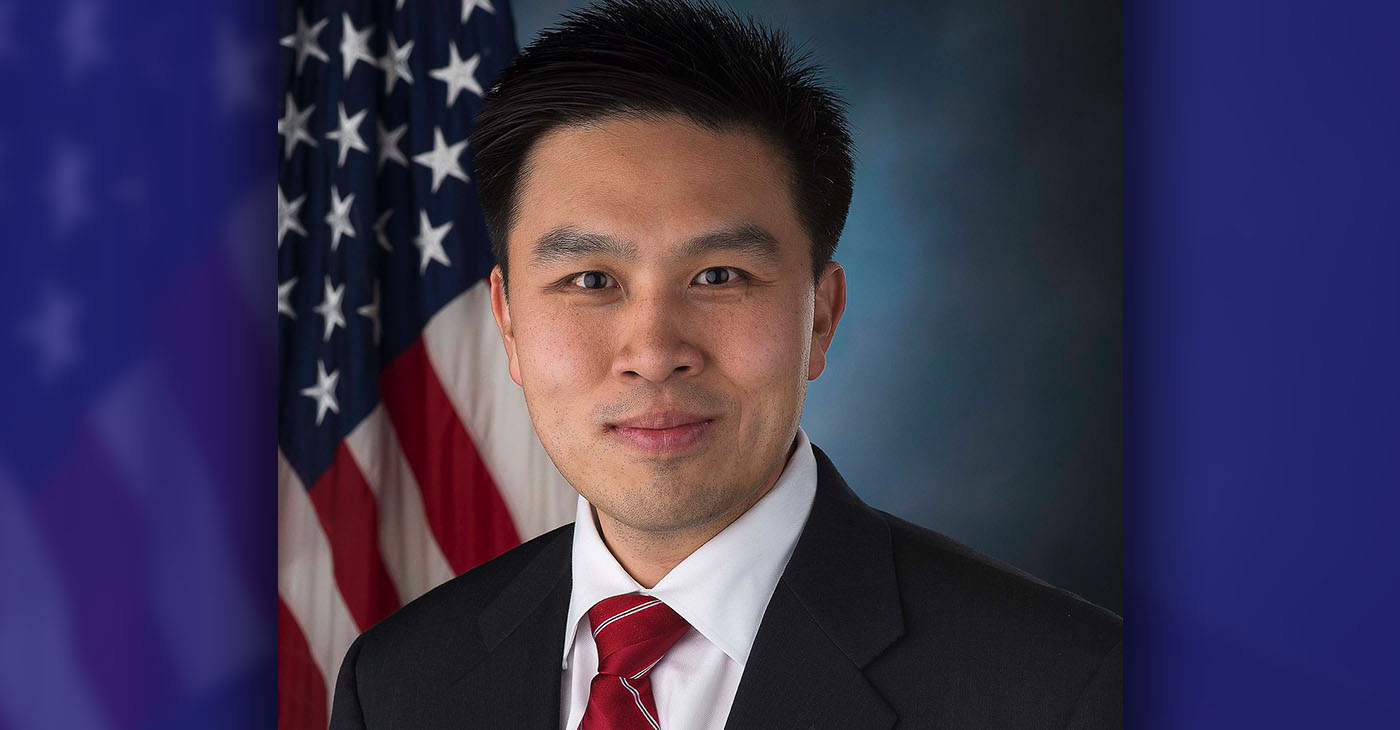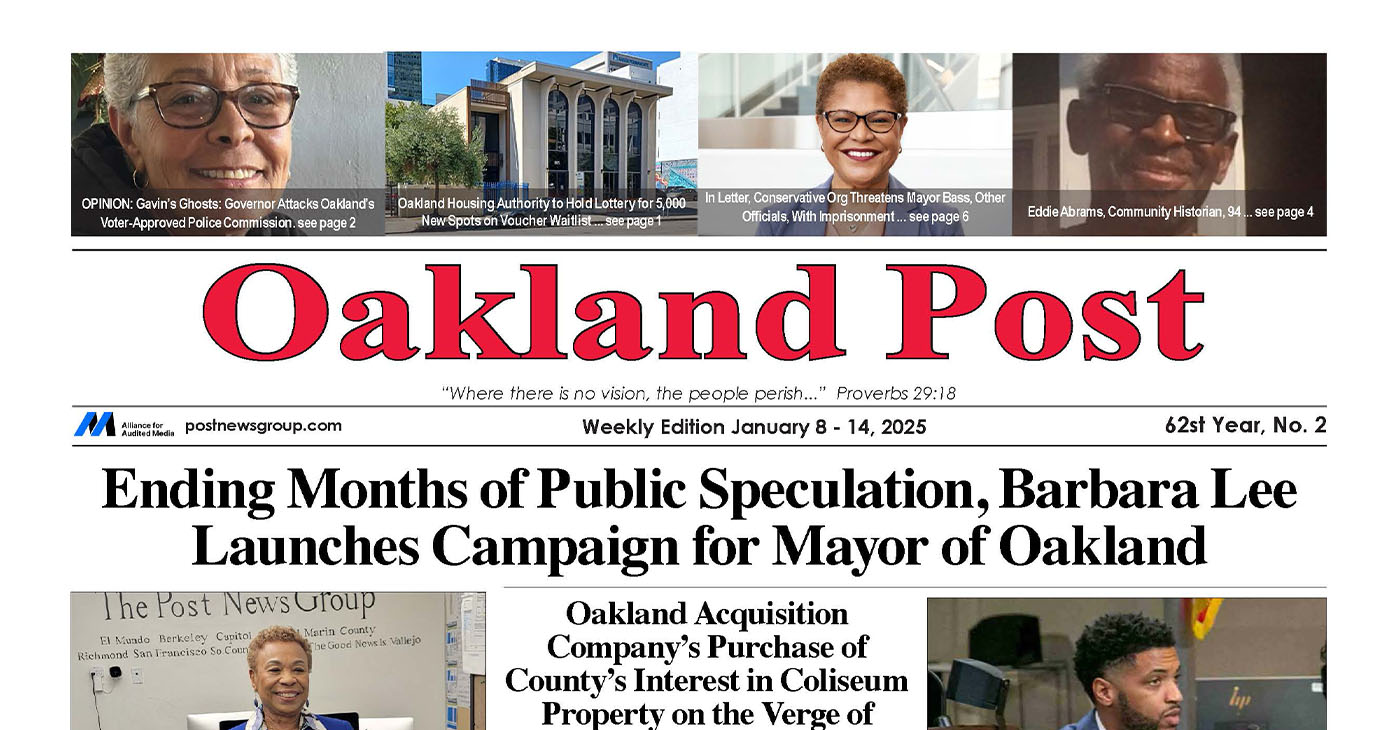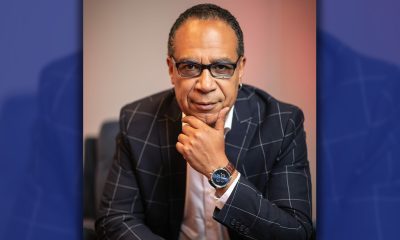Community
GOP Candidate for State Controller Lanhee Chen Known for Bipartisanship
Chen, a Fellow at the Hoover Institution, is respected among Republicans and Democrats for his work across party lines. President Barack Obama appointed him to serve on the bipartisan Social Security Advisory Board. And he has served as adviser to several Republican elected officials, including U.S. Senators Mitt Romney (R-UT) and Marco Rubio (R-FL).

By Bo Tefu, California Black Media
Attorney and Stanford Law School lecturer Lanhee Chen is a Republican running for California State Controller.
Chen, a Fellow at the Hoover Institution, is respected among Republicans and Democrats for his work across party lines. President Barack Obama appointed him to serve on the bipartisan Social Security Advisory Board. And he has served as adviser to several Republican elected officials, including U.S. Senators Mitt Romney (R-UT) and Marco Rubio (R-FL).
The Los Angeles Times recently endorsed Chen, stating that his bipartisan experience is an indication that he would be independent in a state government that is majority Democratic.
Chen spoke with California Black Media (CBM) about his plans to promote fiscal accountability, transparency and the state’s economic advancement.
The conversation has been edited for clarity and concision.
CBM: From your perspective, what is the State Controller’s main function?
Lanhee Chen (L.C.) The State Controller is the chief financial watchdog for the state of California. It’s the individual who gives California taxpayers accountability over every single dollar the state spends. The Controller oversees the disbursement of state funds.
The Controller’s office also has an unclaimed property department. The state keeps a catalogue of all the information people need to claim money they forgot they had.
Perhaps the most important thing the controller does is audit. The Controller is responsible for auditing programs ran by the state government. These audits help the Controller figure out where and how the state spends taxpayers’ money.
The main objectives of this role are financial management accounting and fiscal responsibility.
CBM: Why are you running for Controller?
L.C.: I believe that when we think about the challenges California faces right now, some of those challenges are created by a lack of good fiscal management. A lack of a real set of accountability principles around how our money is being spent. My background in policymaking, academics, and business is exactly the kind of experience that is needed for this job. I’ve spent my career solving problems in fiscal and public policy.
All that experience has prepared me to serve in a role which is predominantly about making sure that the state is spending money wisely. The Controller’s independence from other statewide elected officials is the most important. My track record shows that I have a history of working as a bipartisan problem solver.
CBM: Do you feel being a Republican is a disadvantage or an advantage?
L.C.: The obvious disadvantage is the sheer number of Democrats that outnumber the number of Republicans in the state. There are also some ways that the Republican Party hasn’t been a welcoming and inviting place for people of all backgrounds. I have an immigrant background. I grew up in Orange County. My parents came to the U.S. and managed to put together and raise a great family.
One of the major advantages of this job is that I get to be the one asking tough questions who isn’t in the ‘go along to get along club.’ My background and political affiliation will be helpful in terms of making sure we get answers to tough questions.
In terms of working with Democrats, I have a demonstrated record of working with Democrats and I don’t have an issue working with people who want transparency in terms of how we’re spending our money and where it’s going.
CBM: What experience do you bring to this position?
L.C.: Along with my policy background, I’ve served on boards of regional and community healthcare systems. I’ve also been an entrepreneur and investor for small businesses. My experience helps me understand the business and financial aspects of this job. I know how to look at the financials of our state and figure out what’s going right, what’s going wrong, and how do we give people more information.
Seeing I am also an educator, I can help people understand what’s happening in our state budget.
CBM: If you win, what will be your first priority?
L.C.: The first thing we need is transparency into every dollar the state spends. I want to create a fully transparent, searchable, machine-readable database that allows you to figure out exactly our state is spending money. This project will help us set up a government transparency portal that gives us a sense of whether the spending was effective or not.
Second, I want to use the role’s auditing power and dig deeper into how and what we’re spending on. We need clarity on funding that supports the state’s priority issues such as K-12 education, homelessness, and health care.
CBM: A lot of Black and Brown people work for state government. What is your view on unfunded pension liabilities?
L.C.: Ideally, promises made should be promises kept.
I have a big problem with the idea that we play politics and interfere with pension funds. The primary goal of pension funds is to keep people’s retirement earnings safe and ensure that we’re maximizing the return on the investment that we make. Unfortunately, the state isn’t doing that in a lot of cases. CalPERS and CalSTRS both have not been truthful with us for too many years about what their expectations are about how much in unfunded liabilities we have.
CBM: How would you describe your leadership style? And how does that match with the demands of being the State Controller?
L.C.: My leadership style is about establishing goals and having principles. But it’s also critical to understanding that there’s a time to stand on principle and a time to stand alone. That is a delicate balance. Integrity and ethical leadership are pivotal to making sure everybody’s rowing in the right direction.
This role calls for a leader that isn’t afraid of managing conflict. We won’t not always be on the same page. Fiscal responsibility can only be achieved through transparency and accountability. It is my priority to be the type of leader that lets people know that I’m happy to work together, but I won’t back down on my values or compromise my independence.
Activism
Oakland Post: Week of January 8 – 14, 2025
The printed Weekly Edition of the Oakland Post: Week of January 8 – 14, 2025

To enlarge your view of this issue, use the slider, magnifying glass icon or full page icon in the lower right corner of the browser window.
#NNPA BlackPress
Supreme Court Decision Confirms Convicted Felon Will Assume Presidency
NNPA NEWSWIRE — In a 5-4 ruling, the court stated that Trump’s concerns could “be addressed in the ordinary course on appeal” and emphasized that the burden of sentencing was “relatively insubstantial” given that Trump will not face prison time. Chief Justice John Roberts and Justice Amy Coney Barrett joined the court’s three liberal justices in the majority, with four conservative justices dissenting.

By Stacy M. Brown, NNPA Newswire Senior National Correspondent
@StacyBrownMedia
The Supreme Court on Thursday rejected President-elect Donald Trump’s emergency request to block criminal proceedings in his New York hush money case, ensuring that a sentencing hearing will proceed as scheduled on Friday. The decision makes it official that, on January 20, for the first time in its history, the United States will inaugurate a convicted felon as its president.
In a 5-4 ruling, the court stated that Trump’s concerns could “be addressed in the ordinary course on appeal” and emphasized that the burden of sentencing was “relatively insubstantial” given that Trump will not face prison time. Chief Justice John Roberts and Justice Amy Coney Barrett joined the court’s three liberal justices in the majority, with four conservative justices dissenting.
Trump was convicted in May for falsifying business records related to a $130,000 payment to adult film star Stormy Daniels before the 2016 election. Manhattan District Attorney Alvin Bragg argued that the Supreme Court lacked jurisdiction to intervene in a state criminal case, particularly before all appeals in state courts were exhausted.
Trump’s legal team claimed the sentencing process would interfere with his transition to power and argued that evidence introduced during the trial included official actions protected under the Supreme Court’s prior ruling granting former presidents immunity for official conduct. Merchan, the New York judge who presided over the trial, ruled in December that the evidence presented was unrelated to Trump’s duties as president.
Prosecutors dismissed Trump’s objections, stating that the sentencing would take less than an hour and could be attended virtually. They said the public interest in proceeding to sentencing outweighed the President-elect’s claims of undue burden.
Justice Samuel Alito, one of the four dissenting justices, confirmed speaking to Trump by phone on Wednesday. Alito insisted the conversation did not involve the case, though the call drew criticism given his previous refusals to recuse himself from politically sensitive matters.
The sentencing hearing is set for Friday at 9:30 a.m. in Manhattan. As the nation moves closer to an unprecedented inauguration, questions about the implications of a convicted felon assuming the presidency remain.
“No one is above the law,” Bragg said.
Activism
Barbara Lee Launches Campaign for Mayor of Oakland
“At this critical moment, we must not be a city divided, but a community united,” she Lee. “If elected I will bring my hands-on leadership, new ideas and decades of experience in identifying billions in resources for our great city, so all residents and businesses are stronger and safer and our community has optimism and confidence in Oakland’s future.”

By Post Staff
Barbara Lee on Wednesday morning formally announced her candidacy for Mayor in Oakland’s April 15 special election.
“Time and time again, Oaklanders have faced our toughest obstacles by uniting to meet our challenges,” said Lee.
“At this critical moment, we must not be a city divided but a community united,” she said. “If elected, I will bring my hands-on leadership, new ideas, and decades of experience in identifying billions in resources for our great city so all residents and businesses are stronger and safer and our community has optimism and confidence in Oakland’s future.”
“As Mayor, I’ll address our homelessness crisis, prioritize comprehensive public safety and mental health services, and lead with fiscal responsibility to deliver the core City services residents and business owners deserve. Let’s do this – together.”
“I’ve never shied away from a challenge,” said Lee. “I’m always ready to fight for Oakland.”
Watch her campaign video here, which is online at BarbaraLee4Oakland.com
-

 Activism3 weeks ago
Activism3 weeks agoBooks for Ghana
-

 Arts and Culture4 weeks ago
Arts and Culture4 weeks agoPromise Marks Performs Songs of Etta James in One-Woman Show, “A Sunday Kind of Love” at the Black Repertory Theater in Berkeley
-

 Bay Area3 weeks ago
Bay Area3 weeks agoGlydways Breaking Ground on 14-Acre Demonstration Facility at Hilltop Mall
-

 Activism4 weeks ago
Activism4 weeks ago‘Donald Trump Is Not a God:’ Rep. Bennie Thompson Blasts Trump’s Call to Jail Him
-

 Activism3 weeks ago
Activism3 weeks agoLiving His Legacy: The Late Oscar Wright’s “Village” Vows to Inherit Activist’s Commitment to Education
-

 Arts and Culture3 weeks ago
Arts and Culture3 weeks agoIn ‘Affrilachia: Testimonies,’ Puts Blacks in Appalacia on the Map
-

 Alameda County3 weeks ago
Alameda County3 weeks agoAC Transit Holiday Bus Offering Free Rides Since 1963
-

 #NNPA BlackPress4 weeks ago
#NNPA BlackPress4 weeks agoCalifornia, Districts Try to Recruit and Retain Black Teachers; Advocates Say More Should Be Done



















































